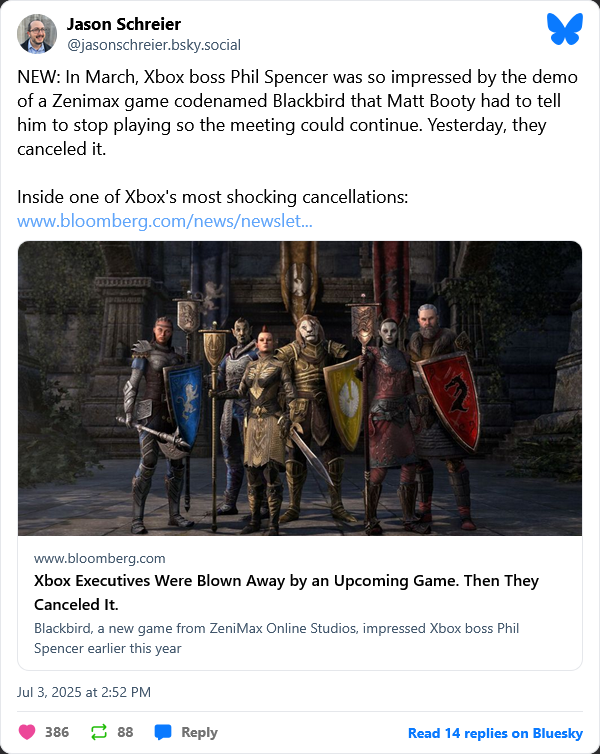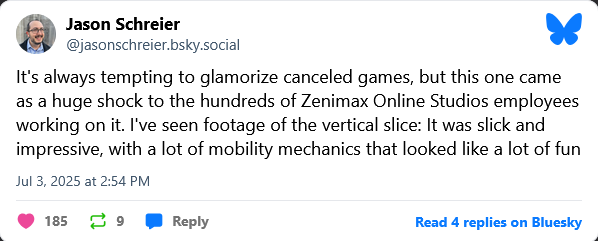https://www.trueachievements.com/news/canceled-xbox-mmo-project-blackbird
Renowned for creating The Elder Scrolls Online, one of the
best Xbox MMOs you can play right now, ZeniMax Online Studios has been working on a brand-new IP for the last several years under the codename Project Blackbird.
Little was known about the project, other than an interview in 2022 with the game's creative director Ben Jones, who revealed that
almost 200 people were working on the "very large-scale project." There had also been a slew of job listings over the last couple of years, which suggested that Blackbird could be aiming for a more modern or futuristic vibe, with some listings asking for developers with experience with driving mechanics.
Now, via trusted sources close to Project Blackbird, we can corroborate reports that the game has been canceled and can also reveal what ZeniMax had planned for the MMORPG.
In Blackbird, you would have played as a Revenant, an operative working for alien syndicates on a remote, tidally locked planet called Soteria. One side of the planet burned under an endless sun while the opposite side was covered in ice. Between the two regions would have been a habitable area known as The Twilight Band.
While the game offered a huge open world to explore, there was a focus on the planet's capital, Exodus, and the many secrets and mysteries hidden within the hovering megacity. Despite being controlled by a sentient AI called PAN, which operated the city's systems and kept everyone in check, five alien syndicates ruled the population in a stratified society with human Revenants acting as a neutral force to maintain balance.
The syndicates were being designed to act as a faction system similar to Bethesda Game Studios' RPGs, and included the Menst, an ancient race of arrogant aliens that believe they're superior to every other species. Alternatively, there were the Calpiten, famous media experts who charm and manipulate their way through the power struggles in the city.
There was also a strange aquatic species called Nemocytes that used exosuits to survive in Exodus. Completely opposite to the Nemocytes were the W'Hurran, a tall, furry species of clannish aliens who were masters of business.
Finally, there were the Trahet, a race feared and respected for their unique abilities to extract someone's deepest, darkest secrets. We would have also come across many other alien species in our travels, from humanoids and animal-esque creatures, large quadropeds, and insectoids.
When not exploring Exodus, you'd be sent out on missions to unlock fresh rewards, similar to Destiny and Warframe. General missions and activities would support up to four players, while Strike missions could have been tackled by up to six players, likely due to being tougher challenges to conquer.
The main storyline involved players solving a high-profile murder and restoring order to Exodus, while repeatable assignments from PAN would see you working to maintain balance within the city, and various side quests would have seen you learning more about the aliens inhabiting the world. Large public events called firefights had also been planned, forcing you to survive within Exodus' constant power struggles.
The missions would be offered by the alien syndicates you work for, seeing you making new friends and enemies as you work to unlock powerful new rewards. Much like ZeniMax's other MMO, Blackbird would have offered players new ways to customize their character, craft and upgrade gear, and complete progressive challenges for higher-quality rewards.
There were also plans for a housing system, daily login rewards, and PvP, although, much like The Elder Scrolls Online, Blackbird would have primarily focused on co-op gameplay and shared-world elements.
ZeniMax had already planned out a launch district called Old Central, and had live service goals in mind. The team had wanted to roll out new events weekly, monthly, and quarterly to keep players busy. It's a similar event system we see in ESO now, so the events could have been filled with unique loot.
Further story chapters, including fresh Districts, main quests, and Zones, would have expanded the world further — again, a similar expansion cycle ZeniMax has used for its fantasy MMO.
So, where would we fit in? We would have played as augmented humans known as Revenants. On Soteria, humankind is seen as the lowest form of life, but some are given the chance to become a Revenant working for the AI PAN. These few are admired by humans and feared by the alien races for their cybernetically enhanced combat prowess, acting as mercenaries to handle dangerous tasks out of reach of anyone else.
According to the initial story ZeniMax was hashing out, Project Blackbird began after a high-ranking syndicate official had been found murdered in a human neighborhood. We would have been called in to investigate the murder, remove various groups creating chaos in the city, and uncover mysteries involving powerful killers and secret leaders. From there, we would then have explored the city and the dangerous outside regions, and begin to uncover more about PAN's role in Exodus.
While the game started in Exodus, seeing you tackle various jobs, a series of events would have eventually led you out into the planet's wilderness. Out in the wilds, you'd learn more about the floating megacity, as well as the Revenants' origins.
Revenants were fully customizable, and the team had already worked out three archetypes, or classes: tanky Guns for Hire, environment-controlling Tech Operators, and healer-style characters called Augments. You would define your character's personality as you progressed through the story, roleplaying various choices and interacting with NPCs that would intentionally come across as morally grey, leaving you to define your own experience.
The team was aiming to use The Elder Scrolls Online's deep character customization and monetization aspects in Blackbird, too, so there could have been some form of in-game store similar to ESO's Crown Store for additional, premium cosmetics.
We'd have completely customized our Revenant, including sculpting their body, adding scars and tattoos, skins and biomodifications, cybernetics and body suit layers, modifying various weapons, and customizing our own apartments, vehicles, and drones.
Our source tells us that the team was experimenting with the skill system when the project was shuttered this week, so nothing concrete had been laid out, but a full progression path and a skill tree would have been present. Although playing similar to Bethesda's RPGs, the team was aiming to have it feel as accessible as Destiny, as dynamic as Warframe, and encompassed in a mysterious world somewhat like Horizon Zero Dawn.
Leaning into the alien noir themes, Project Blackbird was a gritty, atmospheric, and serious in tone, plunging players into a world filled with ancient themes and mystery. Blade Runner had been used as an example for the atmosphere the team was aiming for, using traditional noir techniques for its visual and plot themes.
Traversal was a core aspect of the game, with Exodus offering a vertical playground for players to explore, equipping players with a grappling hook, and, according to our source, you'd have been able to "climb and wall-run on any surface." The team wanted movement to feel natural and fun, similar to that found in games like Spider-Man and the driving in GTA.
ZeniMax wanted players to learn to feel the rhythm while moving, pushing them to adapt to changing obstacles by ensuring the environment had its own visual language — if it looked like you could climb something, you could climb it. With that said, it would have been important that no content was blocked from players who found something challenging; it wasn't a platformer.
That's a process the team has showcased in The Elder Scrolls Online since the beginning, letting players explore content without the worry of level blocking or being unable to get the hang of a certain mechanic. Accessibility has always been one of ESO's defining factors, and likely would have been a success here if Project Blackbird had been given a chance.
With that said, traversal played a major role in the general gameplay loop, which was being designed to have players using the environment to gain the upper hand in fights. Much like the skill system, it was still early days for combat, so we're short on specifics, but multiple weapon types would have been available, alongside upgrades called Amps and the aforementioned skill system to let players craft their own playstyle when taking on enemies.
Interestingly, our source tells us that ZeniMax had been toying with ideas for multiplayer side content away from the combat that would put the traversal system to good use, included races and obstacle courses. One mode the team had been toying with was like a blend of basketball and Quidditch. Our source says, "There was a ball to dunk into a ring, and you could pass or shoot," offering an experience that felt a little like Titanfall 2, although not as fast.
The multiplayer elements and co-op gameplay would have opened up to players after they had completed the tutorial, and could experience everything the game had to offer with friends, or alone if that's what they prefer. Much like ESO, power scaling would have let players play together regardless of their level or skill, while Amps would have opened cooperative synergy.
Sadly, despite offering some promising ideas that I would have loved to have seen in action, Project Blackbird has been "indefinitely shelved" at ZeniMax. It comes as part of Microsoft's latest round of layoffs, which has affected 9,000 employees, including those within the Xbox gaming division.
Some studios appear to have been hit harder than others, with reports suggesting that Forza Motorsport developer Turn 10 has lost nearly 50% of its team and Candy Crush maker King has also reportedly lost around 10% of its employees.
The Initiative, the studio working on the Perfect Dark reboot,
has been closed down entirely, and the game shelved. Rare's long-troubled
Everwild has also been canceled amid the layoffs, and both
ZeniMax studio head Matt Firor and Sea of Thieves director Gregg Mayles have left Microsoft.
It's been a hideous week for the industry, even more so for those affected by Microsoft's latest cuts. From what we can gather, the game cancellations came as a surprise to the teams. In fact, our source tells us that up until July 2, 2025, when Microsoft announced the layoffs, the ZeniMax Online Studios employees working on Project Blackbird had no reason to think the game would be shelved.
In fact, ZeniMax had taken a demo build to Microsoft's Redmond office in October 2024, and our source says the team had seen "good things coming out of that," so Microsoft leadership was impressed with the game.
In a development release review meeting that took place in late June, ZeniMax leadership were not expecting for Microsoft to shelve the game. In fact, the team was preparing to ramp up development after several years in pre-production and was in the process of executing a $300,000 purchase order for hardware when the news came that the game wouldn't be going ahead.
After several years in pre-production, ZeniMax was preparing to enter full production this October. Initially, the team was aiming for a two-year development window with a late 2027 release, but our source says the release window had moved to late 2028.
Employees at ZeniMax received a Teams invite after Phil Spencer's announcement about the layoff, just five minutes before the meeting started on July 2, where they found out that Blackbird wouldn't be going ahead. Staff were already on edge when the meeting started, as ZeniMax studio head Matt Firor was noticeably missing. Instead, Firor's successor, Joe Burba, led the meeting.
Firor "never shied away from delivering the bad news," according to our source, and "was an honest and earnest person," so the team already felt that something might be wrong when the meeting started.
With 9,000 employees working for Microsoft having lost their jobs, three
upcoming Game Pass games canceled, and two seasoned members having left the company, it's a devastating blow for Xbox's studios. Project Blackbird had a lot of potential, and it would have been great to see ZeniMax tread new waters after 11 years with the fantastic Elder Scrolls Online.




 rockstarintel.com
rockstarintel.com




segmentnext.com
